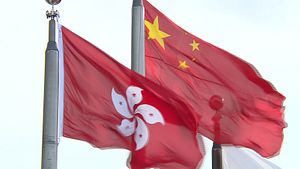This week, U.K. Prime Minister Boris Johnson penned an op-ed published in The Times and the South China Morning Post outlining steps his country is prepared to take to expand entry for holders of British National Overseas (BNO) passports, if China were to move forward with its new decision to introduce a national security law in Hong Kong. Johnson stated that Beijing’s decision to proceed would constitute a violation of the terms of the Joint Declaration, the legally-binding, UN-registered agreement signed in 1984 by London and Beijing which governed the return of Hong Kong to Chinese sovereignty. If necessary, Johnsons said, the U.K. would “willingly” undertake one of the largest changes to its immigration policies and visa system to accommodate Hong Kongers.
The BNO passport is a travel document that grants its holders visa-free entry to the U.K. for six months. However, the current iteration does not carry citizenship rights and does not automatically allow residency or employment. The U.K. government’s proposal would “allow any holder of these passports from Hong Kong to come to the U.K. for a renewable period of 12 months and be given further immigration rights, including the right to work, which could place them on a route to citizenship.”
The British Consulate in Hong Kong estimates that 2.9 million people are eligible for a BNO passport, meaning that nearly 40 percent of the city’s 7.45 million could apply for the document. (Approximately 350,000 Hong Kongers currently hold BNO passports).
The United States’ responses to Beijing’s introduction of the new national security law included U.S. Secretary of State Mike Pompeo stating Hong Kong was no longer autonomous and as such, did not warrant special status under U.S. law. Earlier this week, Pompeo also said the government was considering welcoming people from Hong Kong.
Taiwan has also voiced its intent to develop plans to extend assistance to Hong Kongers who may seek to leave the special administrative region. In a rare statement of unity, the island’s legislative parties condemned China’s national security law, saying that it would deteriorate the situation in Hong Kong and negatively affect people’s rights and freedoms. Taiwanese President Tsai Ing-wen also said “Taiwan will not sit by and watch democracy, freedom, and human rights be degraded in Hong Kong,” in a Facebook post in Chinese.
Still, asylum cases in Taiwan are handled on a case by case basis. While the Taiwan government has said that its plans would affect Hong Kongers’ resettlement, a lack of clarity remains. Taiwan’s National Immigration Agency announced last month that 5,858 Hong Kongers obtained residence permits in 2019, an increase of 40 percent from a year prior. Yet residence permits are typically linked to employment, investment, or school enrollment and are not necessarily long term.
Beijing has been adamant in its response, labeling any external criticism of its legal moves as foreign interference. “We deplore and reject the U.K. side’s unwarranted accusations and blatant interference in Hong Kong-related affairs and China’s internal affairs,” Chinese foreign ministry spokesman Zhao Lijian said. Zhao further urged the U.K. to “reject the Cold-War mindset and the colonial mentality, recognize and respect the fact that Hong Kong has already returned to China as a special administrative region,” implying that London has no standing to speak out about the situation in Hong Kong.
While China’s legislation is not yet in effect and responses by the U.K. and the United States are still developing, what is clear is that developments in Hong Kong are likely to bleed into China’s foreign relations, becoming an potentially combustible flashpoint.
Separately, Hong Kong’s legislative body passed (in a 41-1 vote boycotted by the opposition) a new law making any mockery of the Chinese national anthem a crime, punishable by up to three years in prison and a maximum fine of HK$50,000 (US$6,400). And while authorities refused to grant permission for the annual vigil commemorating the victims of Beijing’s 1989 crackdown on protesters in Tiananmen Square, some Hong Kongers defiantly turned out, gathering in Victoria Park.

































